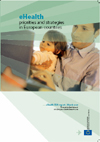 The European Commission, Directorate General Information Society and Media, supports the eHealth ERA Coordination Action project to contribute to the coordination of Member States' eHealth strategy formulation and implementation as well as eHealth-related research and technology development. The project surveys and analyses eHealth roadmaps and programmes across Europe, identifies common priority issues, and develops suggestions for joint actions. All results will consecutively be made available at the eHealth ERA website (www.ehealth-era.org).
The European Commission, Directorate General Information Society and Media, supports the eHealth ERA Coordination Action project to contribute to the coordination of Member States' eHealth strategy formulation and implementation as well as eHealth-related research and technology development. The project surveys and analyses eHealth roadmaps and programmes across Europe, identifies common priority issues, and develops suggestions for joint actions. All results will consecutively be made available at the eHealth ERA website (www.ehealth-era.org).
This report presents fact sheets of all European countries for which validated information about their eHealth strategies and implementation was available to the project by the end of January 2007. In countries not listed in this report, there may nevertheless be eHealth strategies and implementation activities ongoing or planned. The status of activities described is generally August 2006.
The report is the outcome of research in the context of eHealth ERA, which is implemented by empirica GmbH (co-ordinating partner, Germany), STAKES (Finland), CITTRU (Poland), ISC III (Spain), CNR (Italy) and EPSRC (United Kingdom), based on a Coordination Action contract with the European Commission.
Download "eHealth priorities and strategies in European countries" eHealth ERA Report, March 2007(.pdf, 3,39MB)
For further information:
ICT for Health
European Commission - Information society and Media DG
Office: BU31 06/73 B-1049 Brussels
Email: This email address is being protected from spambots. You need JavaScript enabled to view it.
Tel: +32 2 296 41 94
Fax: +32 2 296 01 81
http://europa.eu/information_society/eHealth